Please use this identifier to cite or link to this item:
https://hdl.handle.net/20.500.14356/1288Full metadata record
| DC Field | Value | Language |
|---|---|---|
| dc.contributor.author | Helen, Amanda Douglas | - |
| dc.contributor.author | Subedi, Madhusudan | - |
| dc.contributor.author | Gongal, Rajesh | - |
| dc.date.accessioned | 2023-05-04T08:23:23Z | - |
| dc.date.available | 2023-05-04T08:23:23Z | - |
| dc.date.issued | 2020 | - |
| dc.identifier.citation | HelenA. D., SubediM., & GongalR. (2020). Medical Undergraduates’ Perceptions on Medical Humanities Course in Nepal. Journal of Nepal Health Research Council, 18(3), 436-441. https://doi.org/10.33314/jnhrc.v18i3.2568 | en_US |
| dc.identifier.issn | Print ISSN: 1727-5482; Online ISSN: 1999-6217 | - |
| dc.identifier.uri | http://103.69.126.140:8080/handle/20.500.14356/1288 | - |
| dc.description | Original Article | en_US |
| dc.description.abstract | Abstract Background: Medical humanities is taught in medical schools in the western countries, partly to address the lack of compassion within healthcare. It seeks to develop understanding of human experiences relating to disease, disability and death, through humanities, arts and social sciences. In 2018, Patan Academy of Health Sciences Nepal introduced an eight-week medical humanities course for new medical students. This study aims to evaluate the course from the student participants’ view, exploring their perceptions and experiences. Methods: A mixed method study was used to assess the perceptions of 65 students who completed a semi-structured survey, comprising eight items, with five point- Likert scale and three open response questions. Quantitative data was analysed with results expressed as mean, standard deviation and percentage. Qualitative data was coded and analysed thematically. Results: The students’ perception of the course was strongly positive where 98.5% agreed or strongly agreed it was enjoyable and interesting (items 1,2) and should be continued (item 9). 97% agreed or strongly agreed it made them think differently (item 5) and 96.9% that it was relevant to future careers (item 6). 96.9% agreed or strongly agreed the course helped them understand doctor’s caring roles (item 10) and 92.3% believed it will make them better doctors (item 11). Three themes emerged from open response questions related to perceptions- enjoyable and interesting, positive personal impact and valuable and important. Conclusions: The students had positive perceptions of the medical humanities course, recognizing its’ impact, importance and its value in medical education. Its expansion in the undergraduate curriculum should be considered. Keywords: Evaluation;medical humanities; Nepal; perceptions;students | en_US |
| dc.language.iso | en | en_US |
| dc.publisher | Nepal Health Research Council | en_US |
| dc.relation.ispartofseries | Jul-Sep 2020; | - |
| dc.subject | Evaluation | en_US |
| dc.subject | Medical humanities | en_US |
| dc.subject | Nepal | en_US |
| dc.subject | Perceptions | en_US |
| dc.subject | Students | en_US |
| dc.title | Medical Undergraduates’ Perceptions on Medical Humanities Course in Nepal | en_US |
| dc.type | Journal Article | en_US |
| local.journal.category | Original Article | - |
| Appears in Collections: | Vol. 18 No. 3 (2020): Vol. 18 No. 3 Issue 48 Jul-Sep 2020 | |
Files in This Item:
| File | Description | Size | Format | |
|---|---|---|---|---|
| 2568-Manuscript-18838-1-10-20201115.pdf | Fulltext Article. | 194.29 kB | Adobe PDF |  View/Open |
Items in DSpace are protected by copyright, with all rights reserved, unless otherwise indicated.
